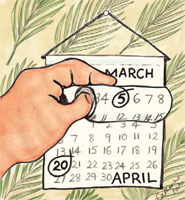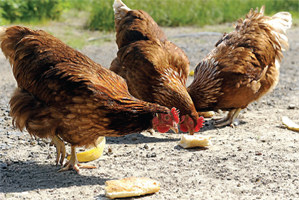Muslims and Jews are rigorously defending the right to kill animals without stunning them first, following a call from the organisation representing Britain’s vets for all halal and kosher meat to be clearly labelled. It’s a debate that has aroused passions on both sides
Ali, a butcher at the Pakeeza Halal Meat store in Balham, south-west London, concedes that “maybe” the halal method of slaughter is cruel. But this concern is apparently not shared by his customers, a surprising number of whom last Saturday were non-Muslims.
Mark Samuelson, a television producer in his forties who describes himself as a “lapsed Catholic”, has been coming here for 20 years. Pointing out that beef fillet costing £5.99 a kilo would sell for £20 or £30 elsewhere, he says the cheapest fresh meat is available at this shop, which is yards from both an organic butcher and a large Sainsbury’s.
As he buys chicken livers for making pâté, Samuelson says he doesn’t volunteer to his dinner guests that his meat is halal. “Then again, they wouldn’t be able to tell the difference,” he adds.
But pressed on the moral issue, Monica Orlebar, buying chicken for a curry, chips in: “They say the animals die very quickly.”
The question of how much animals suffer in halal and kosher slaughter has been raised by the president-elect of the British Veterinary Association, John Blackwell, who last week called for talks with Muslim and Jewish groups aimed at labelling halal and kosher – or “shechita” – meat as produced without the animals being stunned before slaughter. If this couldn’t be agreed, he said, the Government should consider an outright ban.
Were Britain to outlaw halal and kosher meat, it would be following the example of Denmark, whose law banning production of the religiously produced meat last month appears to have prompted Blackwell’s intervention.
Since 1979, the stunning of livestock has been compulsory across the EU, but some member states, including the UK, have exemptions for Muslims and Jews.
Tabloids talk of the rise of “Halal UK”, and in 2012 the Commons narrowly defeated a 10 Minute Rule Bill introduced by the Conservative MP Philip Davies calling for retailers to label all halal and kosher meat as “killed without stunning”, by 73 votes to 70.
Blackwell thinks that an outright ban on slaughtering animals without stunning them is not a long way off. But during a visit to Israel on Wednesday, David Cameron reassured his hosts that he has long defended Jews’ right to produce shechita meat.
“On my watch, shechita is safe in the UK,” he said.
Blackwell’s position is supported by the Federation of Veterinarians of Europe, the Farm Animal Welfare Committee, the Humane Slaughter Association and the RSPCA. “We have tried to keep it out of the religious sphere,” he said. “It is not an attack on religious faith, it is a view that we have taken on animal welfare.”
But religious leaders have expressed concerns that discrimination was behind the move in Denmark, where the Minister for Food, Dan Jorgensen, said that “animal rights come before religion”.
Last month, Lord (Rowan) Williams, the former Archbishop of Canterbury, wrote to the Danish Ambassador in London, Claus Grube, expressing fears on behalf of his Jewish and Muslim friends about a rise in anti-Semitism and Islamophobia in Europe. He is believed to have pointed out that the expression of religious freedom is an internationally recognised human right, over which animal welfare concerns should not be allowed to prevail.
Following the prospect of a ban being raised in Britain, Lord Williams pointed out the apparent contradictions of targeting religiously produced meat rather than factory-farmed produce. He told me: “Guaranteeing humane treatment for animals under law is a proper feature of any humane society. But there are debates we need to have about just how far the methods used by Jewish and Muslim slaughterers can be regarded as gravely inhumane; about whether the rights of animals can indeed trump religious liberty, as the Danish minister seems to be saying ... and above all, about why religious groups should be singled out when some of the major problems of animal welfare are to be found in the routine practices of factory farming in this and other countries. Tender consciences on halal and shechita slaughter don’t sit very well with the overwhelming acceptance of these practices by most of us.”
The ancient kosher and halal methods of slaughter, in which animals are killed with a knife before being drained of blood, are based on verses in the Bible and the Qur’an forbidding the consumption of blood and endorsing “pure” meat. Jews point to Leviticus (7:26-27): “You must not eat any blood whatever, either of bird or of animal, in any of your settlements. Any one of you who eats any blood shall be cut off from your kin.”
The Qur’an has numerous relevant references, including the instruction that “forbidden to you is carrion, and blood, and the flesh of swine, and that over which any name other than God’s has been invoked, and the animal that has been strangled, or beaten to death, or killed by a fall, or gored to death, or savaged by a beast of prey, save that which you [yourselves] may have slaughtered while it was still alive” (5:3).
But it is the ancient nature of religious slaughter that is the problem, according to Professor Andrew Linzey, the director of the Oxford Centre for Animal Ethics. “[The] Jewish and Muslim traditions should reconsider their practice,” he tells me. “It isn’t their fault. Throat-slitting was the most humane method a long time ago. But it isn’t now. Both Jewish and Muslim faiths have their own traditions of compassion and they just need to relate them to modern knowledge.”
However, some religious leaders have argued that their methods of slaughter are less cruel than stunning, which can go wrong. The Board of Deputies of British Jews’ vice president, Jonathan Arkush, responded angrily to Blackwell’s intervention. “Religious slaughter shows the greatest possible concern for the well-being of animals,” he said. “This attack on shechita is deeply regrettable and misleading, not least as it fails to mention the high incidence of mis-stunned meat in the general market … causing [animals] pain, fear and distress.”
But the group Catholic Concern for Animals believes that the slaughter of all animals for food inevitably causes suffering.
“For that reason and other environmental issues we advocate a vegan or vegetarian diet,” said general secretary Chris Fegan.
Back at the halal butcher in Balham, Mark Samuelson is unfazed by the arguments. “To be honest,” he says, “I’m more price-conscious than I am morally averse.”





 Loading ...
Loading ...
What do you think?
You can post as a subscriber user...
User Comments (0)